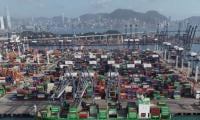Pak-India talks on cards to end stalemate on dams
ISLAMABAD: With a view to end the ongoing stalemate between two nuclear countries over resolution of hydropower issues, the World Bank has stepped up its efforts to soon arrange a meeting between Pakistan and India at secretary level for developing consensus in the light of Indus Waters Treaty (IWT) on mechanism for resolution of ‘faulty designs’ of 300MW Kishenganga and 850MW Ratle hydropower projects.
Well-placed sources told The News that the World Bank wants both the countries to develop consensus either on mechanism of neutral expert or court of arbitration mentioned in the IWT for the resolution of issues pertaining to the said projects. And in case of failure, both the countries need to develop agreement on the middle way to resolve issues.
However, sources said if a secretary of water and power level meeting was held between both the countries, the representatives of World Bank would also be the part of the meeting and they would try to persuade both the parties to reach consensuses to any of the mechanisms or find out a middle way.
Pakistan wants the World Bank to constitute a court of arbitration (CoA) to resolve the disputes, but India wants the solution through the mechanism of neutral experts which is why the World Bank announced ‘pause’ on December 12, 2016 till the agreement on procedure or mechanism between the parties to the dispute -- Pakistan and India.
This was done by World Bank to safeguard the IWT, since referring the matter simultaneously to the processes sought by each of the parties risked contradictory outcomes and worked against the spirit of goodwill and friendship that underpins the Treaty. The World Bank is assisting the two parties in reaching an agreement on the process for resolving the issue of the two hydroelectric power projects. More generally, it is also working with them on how to ensure that the Treaty remains an effective tool to manage the use of Indus basin rivers.
Pakistan had raised objections on the technical designs of both the projects being built by India; one on Chenab and other one on Jhelum river, arguing the designs are not in line with the provisions of the IWT and both projects with the existing designs are detrimental to water interest of Pakistan. The authorities of Pakistan after exhausting every endeavour mentioned in the Treaty had moved the World Bank some months back seeking the solution of water disputes.
Under the IWT 1960, World Bank, the broker of the Treaty, is not allowed to pick up any procedure of the two enshrined in the Treaty on its own to resolve issue or dispute unless parties to the dispute agree on one mechanism of the two that include the constitution of neutral expert and court of arbitration.
-
 Eric Dane’s Friends Initiate GoFundMe To 'support' His Two Daughters After His Death At 53
Eric Dane’s Friends Initiate GoFundMe To 'support' His Two Daughters After His Death At 53 -
 Internet Erupts After Candace Owens Claims Elon Musk And Sam Altman Are ‘not Human’
Internet Erupts After Candace Owens Claims Elon Musk And Sam Altman Are ‘not Human’ -
 Will Princess Beatrice, Eugenie Stay In Contact With Andrew? Source Speaks Out
Will Princess Beatrice, Eugenie Stay In Contact With Andrew? Source Speaks Out -
 ‘AI Revolution Is Coming Fast & US Has No Clue,’ Bernie Sanders Warns Of Speed Of Disruption
‘AI Revolution Is Coming Fast & US Has No Clue,’ Bernie Sanders Warns Of Speed Of Disruption -
 Hong Kong Touts Stability,unique Trade Advantages As Trump’s Global Tariff Sparks Market Volatility
Hong Kong Touts Stability,unique Trade Advantages As Trump’s Global Tariff Sparks Market Volatility -
 ‘Miracle On Ice’ Redux? US Men Chase First Olympic Hockey Gold In 46 Years Against Canada
‘Miracle On Ice’ Redux? US Men Chase First Olympic Hockey Gold In 46 Years Against Canada -
 Friedrich Merz Heads To China For High Stakes Talks In An Effort To Reset Strained Trade Relations
Friedrich Merz Heads To China For High Stakes Talks In An Effort To Reset Strained Trade Relations -
 Astronauts Face Life Threatening Risk On Boeing Starliner, NASA Says
Astronauts Face Life Threatening Risk On Boeing Starliner, NASA Says -
 Hailey Bieber Reveals How Having Ovarian Cysts Is 'never Fun'
Hailey Bieber Reveals How Having Ovarian Cysts Is 'never Fun' -
 Kayla Nicole Looks Back On Travis Kelce Split, Calls It ‘right Person, Wrong Time’
Kayla Nicole Looks Back On Travis Kelce Split, Calls It ‘right Person, Wrong Time’ -
 Prince William And Kate Middleton Extend Support Message After Curling Team Reaches Olympic Gold Final
Prince William And Kate Middleton Extend Support Message After Curling Team Reaches Olympic Gold Final -
 Nvidia CEO Praises Elon Musk, Calls Him An ‘extraordinary Engineer'
Nvidia CEO Praises Elon Musk, Calls Him An ‘extraordinary Engineer' -
 Shia LaBeouf's Mugshot Released After Mardi Gras Arrest On Battery Allegations In New Orleans
Shia LaBeouf's Mugshot Released After Mardi Gras Arrest On Battery Allegations In New Orleans -
 Timothee Chalamet Felt '17 Again' After Reunion With 'Interstellar' Director Christopher Nolan
Timothee Chalamet Felt '17 Again' After Reunion With 'Interstellar' Director Christopher Nolan -
 Conan O'Brien Speaks First Time After Rob Reiner's Killing
Conan O'Brien Speaks First Time After Rob Reiner's Killing -
 Giant Tortoise Reintroduced To Island After Almost 200 Years
Giant Tortoise Reintroduced To Island After Almost 200 Years



